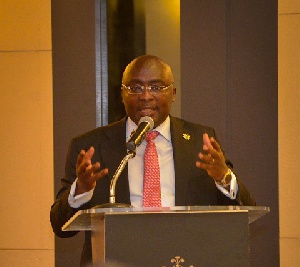The Vice President, Dr Mahamudu Bawumia, on Wednesday launched the Phase-Two of the Mobile Money Interoperability Payment System and urged Ghanaians to adopt electronic payment as a way of life.
He said the nation had reached an era of electronic payment, therefore, there was no choice but to go with the tide in order to fast-track the transformation of the economy.
The launch of the Phase-Two of the Interoperability System has, therefore, completed the interconnection between mobile money and the e-switch Payment System to the Ghana National Link Switch.
This implies that customers could conveniently move funds seamlessly across all three platforms - bank accounts, mobile money and e-switch and vice versa.
The Phase-One of the Interoperability System was launched on May 10 this year, by Vice President Bawumia at the Accra Marriot Hotel, which saw the interconnection of the mobile money platforms and Ghana National Link Switch (gh-link system).
According to the Ghana Inter-Bank Payment and Settlement System, 1.4 million transactions have been recorded, valued at GHc140 million as at October this year.
Vice President, Bawumia therefore, urged the Fintechs to take advantage of the Interoperability System to collaborate with the banks and other financial institutions to offer novelty products and services to customers.
He noted that the Interoperability System would improve financial inclusion by bridging the gap between the banked and unbanked population.
“It should also translate into quick turnaround for businesses because producers, wholesalers and retailers can receive funds in real time in order to deliver the goods to customers, regardless of which part of the country they find themselves,” Vice President Bawumia noted.
Those initiatives, he said, were in sync with other programmes being rolled out by President Nana Addo Dankwa Akufo-Addo’s government to quicken the digitisation of the economy.
He, thus, underscored the need to take a second look at the ceiling placed on transfer of money via mobile money and other security aspects so that the system is not compromised.
This is expected to remove the constraints people encounter in trying to move funds around in real time, integrate the banked and unbanked population, and also end the Financial Inclusion Triangle.
Vice President Bawumia, however, proposed a Third-Phase of the Interoperability System, suggesting that a mobile money agent or merchant with one phone SIM card should be able to load electronic funds onto the wallet of the customer, regardless of the customer’s network.
Currently, an agent needs to keep different float accounts for each operator to serve customers, therefore when the float of the agent for a particular operator runs out the agent is unable to serve customers from that operator even though the agent may have electronic funds sitting idle on another network.
In view of that, agents turned away customers not because they did not want to serve them, but because they simply could not use the float they have for one network operator for another.
Dr Bawumia noted that the status quo was not efficient and often affected output and profitability as well as putting a spoke in the wheels of the cash-lite agenda.
He, therefore, tasked the GhIPSS, telecommunication companies, Fintechs and other financial institutions to fix the challenge so that anybody who walked into an agent’s location could get service once there were electronic funds available.
“With the level of interoperability we have achieved, there is no reason why we cannot begin as a country to accept payments for statutory fees and taxes through mobile money and e-switch,” he said.
“We only need to create administrative systems and processes that will recognise the use of these two as the formal ways of making payments.”
Dr Bawumia was optimistic that by the second quarter of 2019, all payments to government agencies would be done electronically, and gave the assurance that government was leaving nothing to chance in ensuring the holistic transformation of the economy.
The interoperability payment system was designed and facilitated by the Ghana Inter-Bank Payment and Settlement System, telecommunication companies and financial institutions, which would ensure integrity of the transfer of funds.
The launch, which took place at the GhIPSS Headquarters in Accra, attracted key stakeholders in the electronic payment system including boards, managements and Chief Executive Officers of the Ghana inter-bank Payment and Settlement System, Ghana Telecommunications Chamber and telecommunication and financial institutions.
Business News of Thursday, 29 November 2018
Source: ghananewsagency.org

















